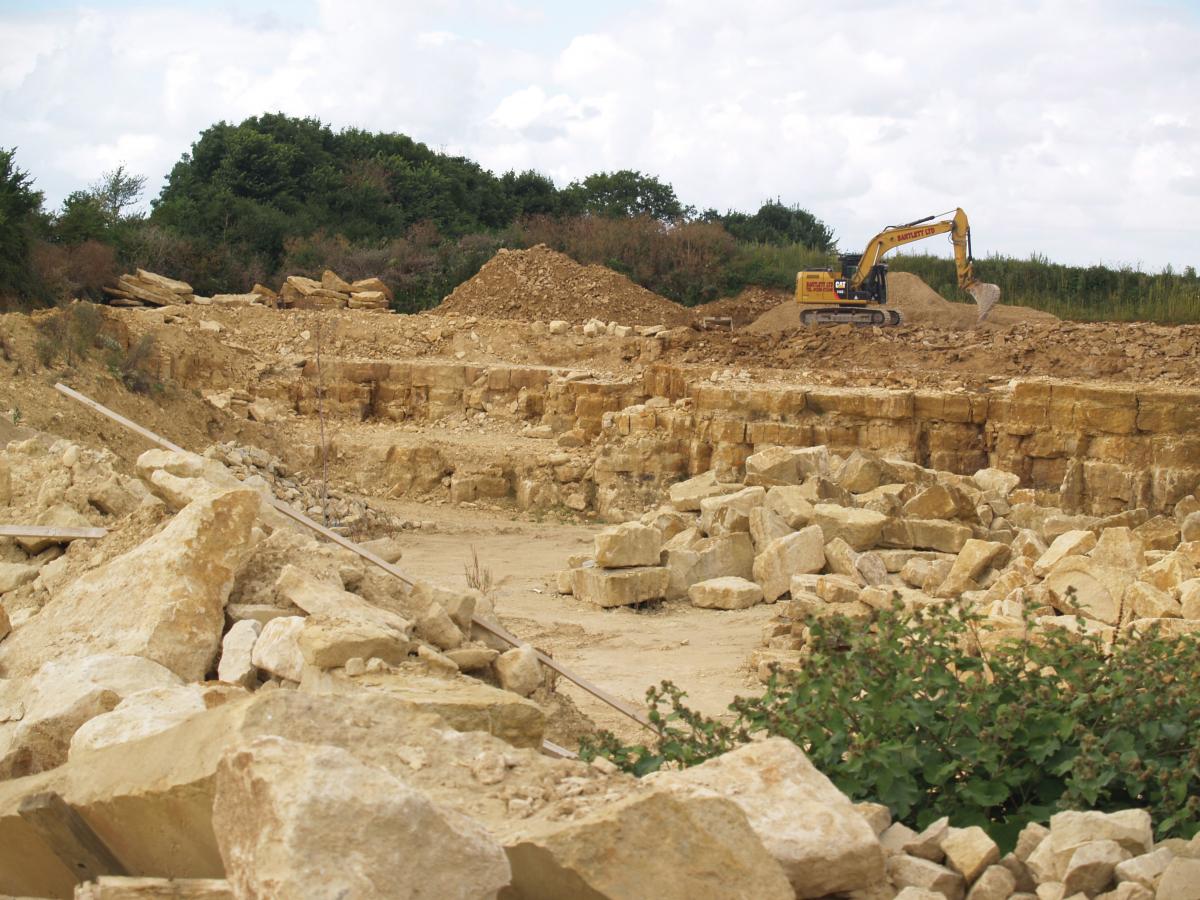Marnhull Stone Ltd : A stone ready to make a name for itself
Dorset is best known for its Portland and Purbeck limestones. But now Marnhull Stone Ltd would also like to get its stones better known a little further afield.
Marnhull limestone is a bit like Purbeck in as much as it has particularly distinctive beds. The latest bed currently being tested from 3m below what has been the floor of Marnhull Stone Ltd’s Whiteway Quarry is different again. It looks similar to Forest Marble, and has comparable properties.
The variety of stone from the different beds was on display in August at the Gillingham & Shaftesbury Agricultural Show, where Marnhull Stone took a stand to promote its stones as paving, fireplaces, building stone and masonry.
 Marnhull was helped out by Simon Brown, of stone company Simali Stone, which has made a feature of supplying the local stone as flooring, although it also offers the expected imported stones and, these days, various porcelain tiles.
Marnhull was helped out by Simon Brown, of stone company Simali Stone, which has made a feature of supplying the local stone as flooring, although it also offers the expected imported stones and, these days, various porcelain tiles.
Simon made up the display panels of stone on the stand, showing various styles of flooring, which helped attract visitors during the show.
The fact that Marnhull Stone was exhibiting is indicative of the company’s ambitions to expand, trying to attract customers from a broader geographical area outside its fairly limited traditional catchment around the quarry in Dorset. It is still a small business but, as Rob Bartlett, co-Director with his sister, Tina, says: “We have to start somewhere.”
It has already come a long way since Dean Harris started managing the operation six years ago. Rob Bartlett admits that before Dean came on board he had been on the point of closing down the quarry that his father had opened 30 years earlier.
It was a local mason-cum-builder, John Ridley, who, wanting to secure the source of the stone, had suggested Rob might like to contact Dean Harris.
Rob already knew Dean from when Dean was Production Manager at Wessex Stone, with its Elm Park, Chilmark and Hurdcott stones. But when that business closed Dean went to work for Albion Stonemasons in Salisbury. Albion had worked closely with Wessex Stone and has retained its links with Dean and become a valued customer of Marnhull.
Dean admits that, having held a managerial position at Wessex Stone, he had found it hard to give up that level of responsibility at Albion. So when he was approached to join Marnhull Stone and manage the natural stone side of Rob’s various interests (which also include agricultural contracting and civil engineering) he was keen to accept.
Now, far from being in danger of closing, Marnhull’s Whiteway Quarry is being extended. An extra five acres of land have been bought and Marnhull has obtained planning permission to extend the quarry on to it.
The stone is easily won, being lifted off the face by one of Rob’s excavators. The beds are typically 400mm thick but can be up to 1.2m. Enough of the stone can be extracted to meet current demand in a month or so of campaign quarrying once a year. That, along with blocks of Portland and Bath limestones that are bought in to be sawn there as well, provides sufficient material to keep the on-site workshop busy all year.
The workshop is soon to get an extension as well, having already been upgraded with the addition of a British-made Wells Wellcut 1200mm saw, complementing the still operational, if rather old, Anderson Grice.
Rob: “I said to Dean: here’s the quarry; what do you need. He said he needed a 1200 Wellcut, so that’s what we got.”
Dean likes the stone to stand in the quarry before it is sold, as is traditional, allowing the quarry sap to dry out and enabling frost to separate the beds naturally before the blocks are sawn.
Marnhull does not sell block straight from the quarry to masonry companies but prefers to add value by selling it sawn six sides, as floor tiles and as ashlar and walling.
Dean is proud of the accuracy of the sawn stone the company produces and is confident the Wellcut is every bit as precise as a Spielvogel or GMM, which would have been the alternatives for the workshop.
As well as the saw, Marnhull has now recruited a young man, Sean Garrett, who has just completed a masonry course with Weymouth College. He is working alongside Dean and Bob Thorne (Bob makes the cropped walling stone the company sells).
There are only three of them working in the quarry and its workshop, so they all pitch in with whatever needs doing. But Sean was taken on because Marnhull was finding it frustrating having to contract out masonry work required by customers, even when it was something as simple as a bit of chamfering for a window cill.
While the stone from Whiteway Quarry might be similar to Purbeck in that it is limestone and has distinctively different beds, it is not the same stone. Geologically, it is Osmington Oolite, part of the Corallian Group of Jurassic stones laid down 208-146million years ago. The fossils, very apparent in some of the beds, consist of oyster shells and gastropods.
The quarry has become a favourite haunt of Dorset Important Geological Sites Group (DIGS), established in 1993 to conserve the county’s geological history.
The stone has been extensively used for building in the area around the village of Marnhull for centuries. Probably the most important building constructed in it is Nash Court, once owned by Glastonbury Abbey and given by Henry VIII to Catherine Parr, the last of his wives, following the Dissolution of the Monasteries.

